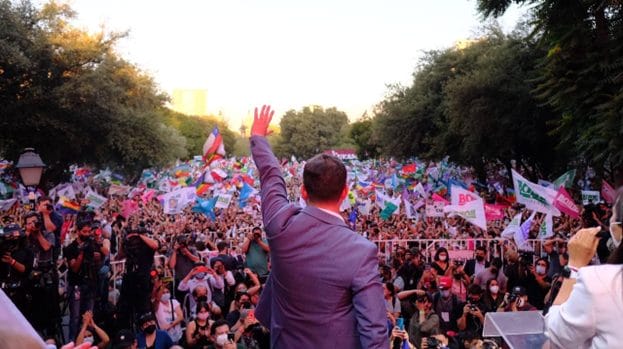“The arts kept the movement alive,” Gustavo explains. “If you march every day, you reach less people. If you adopt creative tactics, you draw people in. For this reason, you can trace the evolution of Chilean social movements just by looking at how protesters sing.”
Through protest, song, and dance, Chileans had begun resolving the Crisis of Representation.
The 2019 anti-inequality mobilizations turned out to be the largest in Chilean history. Millions flooded the streets to demand new forms of political representation.
“Pandora’s box is now wide open,” as Franco-Chilean historian and sommelier Francisca Herrera Crisan put it at the time, “letting the ghosts of the past escape, finally forcing us to face them. In pain, certainly, but also in the hope set free from the box: that of a people rediscovering themselves.”
Only a worldwide virus, notes the psychologist Gustavo, proved strong enough to slow that opening. Even so, Chile’s then president, the right-wing Sebastián Piñera, would soon concede to protester demands and announce a plebiscite to determine the fate of Pinochet’s constitution. In October 2020, 78 percent of Chileans voted to scrap the document, initiating a new and historic constitutional drafting process.
By early 2022, the future looked bright. A new constitution was taking shape, and Chile had just inaugurated its youngest president ever: the 36-year-old Gabriel Boric Font, a former student leader elected on an ambitious reform platform. Boric’s election signaled a new direction for Chile. He represented the voice of the young and the dispossessed.

Gabriel Boric addresses his closing campaign event. Photo: Twitter/ Gabriel Boric.
But that hope soon dissipated. Assorted scandals plagued the constitutional assembly, and, after a concerted disinformation campaign, an overwhelming majority of voters rejected the assembly’s draft constitution. Chile’s far right used this political blunder to seize control of the constitution’s second drafting assembly.
In the meantime, Boric has faced strong political headwinds. Inheriting a deeply polarized country, he has found it difficult to build the broad coalitions necessary to pursue crucial reforms.
The story doesn’t end here.
The only way past the Crisis of Representation turns out to be through it, and in Chile the gears for change are still turning. Recent political setbacks have not detracted from Chile’s inspiring victories in deepening democratic engagement.
“These movements served as an important cultural catalyst,” explains the professor Jose. “They made us realize that it was possible to protest and demand a better future.”
Pushback, of course, will always come. Newton’s third law promises that. But if we look at the long trend, we’ll see it traces a positive trajectory. The social process initiated in 2019 has not run its course. The struggle remains alive, now more than ever.
During periods of demobilization, we must pause to regroup — using the lull in momentum as a chance to learn from the past and envision the future. This is the natural rhythm of change, the ebb and flow of progress.
I leave you with the last words of President Salvador Allende, delivered while defending Chile’s presidential palace from the conspirators of the 1973 coup:
“Neither crime nor force can delay social processes,” said Allende. “History is ours and it is made by the people.”
“Go forward,” he assured, “knowing that, sooner rather than later, the great avenues through which free men pass to build a better society will open once again. Long live Chile! Long live the people! Long live the workers!”

